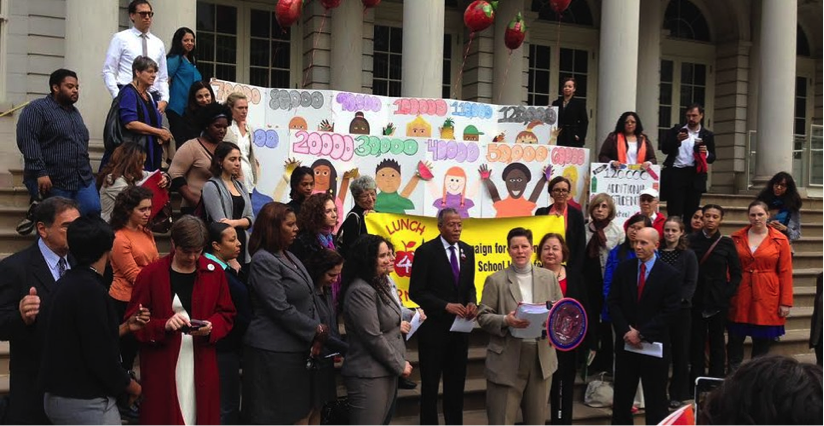Back to School with Universal Free Lunch for Children in NYC Middle Schools

City Hall Demonstration in Support of Universal Free Lunch. Credit: Lunch for Learning
When school starts this September, school lunch will be served free of charge to any NYC middle school student who wants one. The free-for-all system will replace the current means-tested approach for the city’s approximately 170,000 middle schoolers in all of its nearly 300 middle schools. I welcome this crucial first step first step toward providing universal free lunches to all NYC public school students. On any given day, there are about a quarter million students in the city’s schools who are eligible for free meals but do not eat them, and thousands more who are not income eligible but are still in need. Social stigma deters many of those eligible to eat free, and cost makes the meals out of reach for others. The Lunch 4 Learning Campaign led by Community Food Advocates which has mobilized support for an end to the school food means test has achieved a major victory! Much of the credit should go to the Public Advocate for her outspoken support, and to the NYC City Council, which, under the leadership of Speaker Melissa Mark-Viverito, included funds in its budget to begin city-wide implementation of universal free meals.
Last June, the DeBlasio administration chose the less expensive course of trying out the approach in middle schools first. The middle school roll-out is estimated to cost an additional $6.25 million, while full-scale universal lunch was expected to add about $20 million to the city’s school food expenditure. Why middle schools? Because this is when students develop acute awareness of their peers and the stigma that deters participation sets in. Currently, participation drops off sharply from the rates in elementary school, where about four fifths of children eat the school meal, to middle, school where only about 61% do so. The decision also appears to reflect a spirit of experimentation and caution. With 1.1 million students, approximately 1700 schools, and more than 1200 buildings, the New York City school system is huge.. SchoolFood with its more than 8,000 employees is not a system that can turn on a dime. Even some advocates who pressed hard for citywide implementation of universal through the federal government’s new Community Eligibility Program [CEP], have conceded that rolling out the program in middle schools first will permit a more careful and deliberate program change. I agree, and I’m thrilled to learn that New York City Schools Chancellor Carmen Farina sees the new approach as part of a broader transformation of the school meal experience. School food activists must continue working with SchoolFood to support its efforts to provide healthy and appealing meals using as much locally sourced food as possible, with principals and staff to create a calm and wholesome atmosphere in the lunchroom, and with teachers to make full use of the “cafeteria as classroom,” to build food education into the curriculum.
It is important to do “universal” well in New York, not only for the well-being of the city’s school children and their families, but also because of the city’s potential leadership role in a national discourse on how to do school food better. Making the meals free for all is essential if school food is ever to be integrated into the curriculum, just as raising nutrition standards is essential if the health-promoting potential of school food is ever to be realized. In the case of the nation’s largest school system, the old notion that “If you can do it here, you can do it anywhere” has the ring of truth.
There are many aspects of the implementation of universal free school lunch about which we may be tempted to adopt a wait-and –see attitude, but it seems to me that some systematic observation of the process is in order. Here are just a few of the questions to which I think researchers and others should pay attention:
1. Communication. How are principals informed of the new policy? What sort of specific instructions do they receive concerning implementation of the new system in their schools?What if any activities are mandated to introduce the new policy to teachers, parent advocates and other staff? To parents and students?
2. Messaging: how is the new policy framed for parents and for students?
3. Impact: how does participation change in schools that implement the universal policy?
4. Open and closed campuses: some schools permit students to leave the premises at lunchtime; others do not. How does the impact of universal free lunch differ in these two types of settings? What are the specific challenges characteristic of open and closed campuses?
5. Labor hours. If more children eat, more meals must be prepared. How readily does SchoolFood add and train new staff as participation expands?
6. Cafeteria atmosphere. As school meals are decoupled from social class and freed from stigma, to what extent do the meals become an integrative factor in the school day?
Researchers at the NYC Food Policy Center at the CUNY School of Public Health and at the Laurie M. Tisch Center for Food, Education and Policy, Teachers College, Columbia University have begun to discuss the need to observe and document the implementation process. Additional ideas and perspectives are welcome. Send them to me at JP@nycfoodpolicy.org.
By Janet Poppendieck, Ph.D., Policy Director, NYC Food Policy Center at Hunter College.


